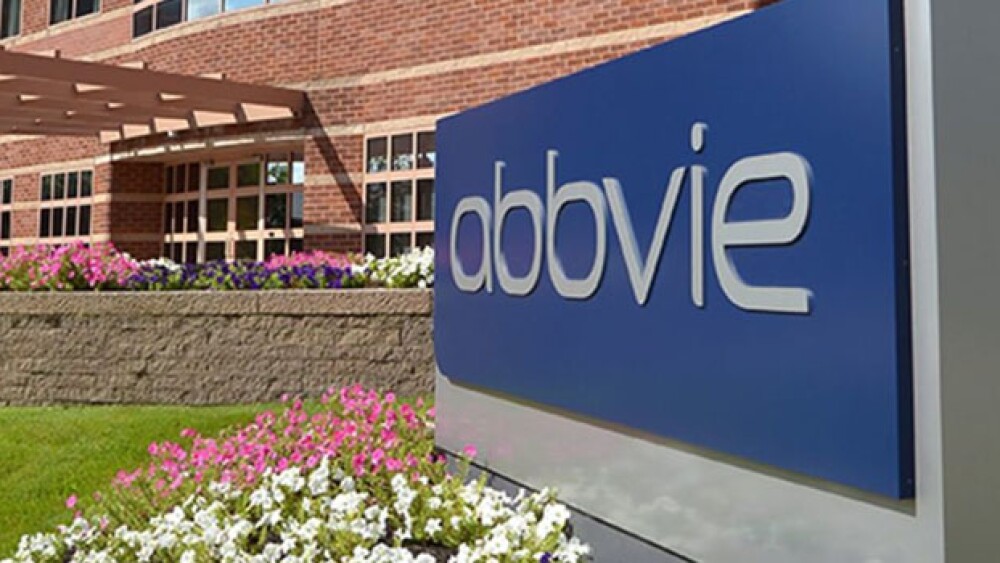Illinois-based AbbVie halted a Phase III trial evaluating Rovalpituzumab Tesirine (Rova-T) as a second-line therapy for advanced small-cell lung cancer after an Independent Data Monitoring Committee called for the stoppage due to shorter overall survival in the Rova-T arm.
Illinois-based AbbVie halted a Phase III trial evaluating Rovalpituzumab Tesirine (Rova-T) as a second-line therapy for advanced small-cell lung cancer after an Independent Data Monitoring Committee called for the stoppage due to shorter overall survival in the Rova-T arm.
The early stop for survivability issues, as well as previous failures, casts a shadow over the billions of dollars the company forked out for the drug two years ago. AbbVie acquired Rova-T in 2016 when it bought the company Stemcentrx for $5.8 billion in upfront payments with another potential $4 billion in milestone payments on the table. In its announcement, AbbVie said that the trial halt only applies to this one study and not others involving Rova-T.
Rova-T is an antibody-drug conjugate that targets the cancer stem cell-associated target delta-like protein 3 (DLL3). That protein is found in more than 80 percent of small-cell lung cancer (SCLC) patient tumors. The protein is prevalent on tumor cells, including cancer stem cells, but not present in healthy tissue. Rova-T combines a targeted antibody that delivers a cytotoxic agent directly to the DLL3-expressing cancer cells while minimizing toxicity to healthy cells.
This isn’t the first failure for Rova-T in lung cancer. Following disappointing Phase II results, AbbVie announced that it would not seek accelerated approval for Rova-T in third-line relapsed/refractory (R/R) small cell lung cancer (SCLC). The Phase II TRINITY trial assessed Rova-T in patients with a relapsed/refractory form of the disease after receiving at least two previous treatments. The trial showed a 16 percent objective response rate and median overall survival of 5.6 months in patients who had received the treatment.
When AbbVie acquired Stemcentrx, Rova-T was being investigated as a potential third-line treatment in SCLC where there was no approved therapy. In Phase I/II studies of relapsed SCLC patients who have previously failed one or more standard therapies, Rova-T demonstrated overall response rates of 44 percent in the patients identified with high expression of DLL3.
When AbbVie picked up Rova-T, the company was eying more than just the lung cancer market. AbbVie was banking on using the drug to target other cancers where expression of DLL3 was high, such as metastatic melanoma, glioblastoma multiforme, prostate, pancreatic and colorectal cancers. In those cancers, DLL3 expression ranges from 50-80 percent, AbbVie said at the time it acquired Stemcentrx.
However, the future of Rova-T could be in doubt. On Wednesday, AbbVie halted the Phase III TAHOE trial and that sent shares of AbbVie sliding. The stock closed down more than 3 percent and is also down about 2 percent in premarket trading.
The TAHOE trial was designed to assess the efficacy, safety and tolerability of Rova-T versus the chemotherapy drug topotecan in patients who have advanced or metastatic small-cell lung cancer with high levels of DLL3 and who have had disease progression during or following front-line platinum-based chemotherapy.
Michael Severino, AbbVie’s chief scientific officer, said the company remains committed to its mission to discover and develop “transformative therapies” for people with cancer. Severino said the company was grateful for the patients and physicians who participated in the trial.
Rova-T continues to be studied as part of a combination treatment with Bristol-Myers Squibb’s Opdivo and Yervoy in early-stage trials.





